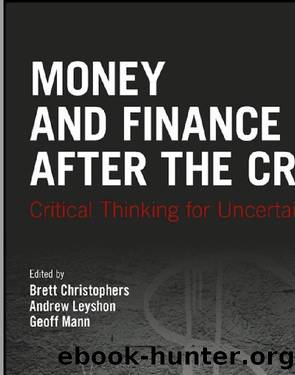Brett Christophers by Money & Finance After the Crisis

Author:Money & Finance After the Crisis [Inconnu(e)]
Language: fra
Format: epub, azw3
Published: 2020-05-02T05:20:01.724000+00:00
* * *
b a n k s i n t h e f r o n t l i n e
127
strategic outcomes of the pursuit of terrorism financing, I am not neces-
sarily arguing that policies have hidden agendas that deviate from their
stated objective. On the contrary, it is the cumulative effect of the
financeâsecurity assemblage doing âexactly what it says on the coverâ
that, taken together, produce these effects (Christophers 2012). This is
what Jane Bennett (2005, p. 447) calls the agency of assemblages: âthe
distinctive efficacy of a working whole made up, variously, of somatic,
technological, cultural, and atmospheric elements. Because each memberâ
actant maintains an energetic pulse slightly âoffâ from that exuded by
the assemblage, such assemblages are never fixed blocks but openâended
wholes.â Put differently, outcomes are conceived as âunstable cascadeâ
rather than as causal effects (Bennett 2005, p. 457; also De Goede 2012:
chapter 2).
The transnational landscape of laws, institutions, treaties and private
initiatives that play a role in fighting terrorism financing, is complex, not
necessarily transparent, and pulling in different directions. Considerable
tensions, gaps and disjunctures persist within it, problematizing (too)
coherent and powerful renditions of US hegemonic power or homoge-
nous neoliberalism (e.g., Bennett 2010). In the war on terrorism
financing, these tensions are important and longâstanding. For example,
within this regulatory complex a struggle persists over whether efforts
should concentrate on freezing monies (with all its attendant juridical
problems) or on following monies (deploying sophisticated financial
data analysis to rendering visible suspect networks). A related
tension â explored below â concerns the contingency of commercial
opportunities made possible with fighting terrorism financing. Cleary, a
strong transnational policy agenda to reregulate transnational banks
and impose substantial compliance duties and fines is broadly under-
stood as restricting the power of capital (rather than fostering it). At the
same time however, important opportunities are emerging for (USâbased)
firms and financial data mining software companies.
The HSBC Settlement
In 2012, Britishâheadquartered bank HSBC (Hong Kong and Shanghai
Banking Corporation) concluded a settlement with US authorities,
including the Department of Justice and the Office of Foreign Assets
Control (OFAC), for 1.9 billion US$. The agreement followed a
protracted investigation by the US Senate Committee on Homeland
Security and Governmental Affairs into alleged money laundering and
terrorist finance abuses at HSBC, and settled claims that the bank delib-
erately evaded US controls and sanctions. Under the terms of the
Download
Brett Christophers by Money & Finance After the Crisis.azw3
This site does not store any files on its server. We only index and link to content provided by other sites. Please contact the content providers to delete copyright contents if any and email us, we'll remove relevant links or contents immediately.
Rich Dad Poor Dad by Robert T. Kiyosaki(6632)
Pioneering Portfolio Management by David F. Swensen(6300)
How To Win Friends and Influence People by Dale Carnegie(4513)
The Money Culture by Michael Lewis(4207)
The Dhandho Investor by Mohnish Pabrai(3765)
The Wisdom of Finance by Mihir Desai(3747)
Liar's Poker by Michael Lewis(3449)
Fooled by Randomness: The Hidden Role of Chance in Life and in the Markets by Nassim Nicholas Taleb(3124)
The ONE Thing by Gary Keller(3071)
Mastering Bitcoin: Programming the Open Blockchain by Andreas M. Antonopoulos(3045)
The Intelligent Investor by Benjamin Graham Jason Zweig(3041)
The Psychology of Money by Morgan Housel(3036)
Rich Dad Poor Dad: What The Rich Teach Their Kids About Money - That The Poor And Middle Class Do Not! by Robert T. Kiyosaki(2958)
Investing For Dummies by Eric Tyson(2954)
How to Day Trade for a Living: Tools, Tactics, Money Management, Discipline and Trading Psychology by Andrew Aziz(2949)
How to Win Friends and Influence People by Dale Carnegie(2915)
Market Wizards by Jack D. Schwager(2700)
How to Pay Zero Taxes, 2018 by Jeff A. Schnepper(2655)
Zero Hour by Harry S. Dent Jr. & Andrew Pancholi(2647)
